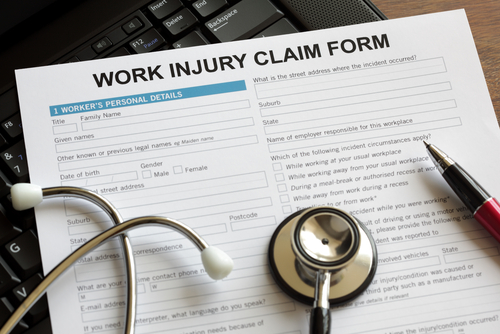Navigating the Complexities of Workers’ Compensation Claims
Navigating the complexities of workers’ compensation claims can be daunting, especially when you’re dealing with the aftermath of a workplace injury. Knowing the right steps to take after a work injury and understanding how to protect your workers’ comp claim is crucial to safeguard your rights and begin the Georgia workers compensation claim process effectively.
Our team, with extensive experience in handling workers’ compensation cases, is here to guide you through every step. We understand the intricacies of Georgia workers compensation law and are dedicated to helping injured workers secure the benefits they deserve.
Whether you’ve just been injured at work and wonder what your rights are, or you’re unsure about what to do after a workplace injury, we’re here to help. Quick action is vital—not only to ensure proper medical treatment, but also to avoid complications with your claim. Quick action is also essential to protect against employer retaliation.
Understanding the Workers’ Compensation System
The workers’ compensation system is designed to provide support for employees who suffer work-related injuries or illnesses. This includes coverage for medical expenses, lost wages, and other related workers compensation benefits. However, without the proper guidance, it’s easy to misstep.
That’s why we emphasize the importance of acting fast. Report the workplace injury to your employer right away, seek medical care, and begin documenting everything. These early actions lay the groundwork for a strong workers’ comp claim.
7 Essential Steps to Take After a Work Injury Protect Yourself
We’ve created a helpful guide outlining the 7 critical steps to take after a work injury to protect your workers’ compensation claim, ensuring you’re empowered and protected throughout the process. These steps will walk you through what to do immediately after an accident, how to file a workers comp claim, and what to expect.
If you believe your employer may be taking adverse action, it’s important to understand your protections—employer retaliation for injury is illegal, and you have rights.
Don’t navigate this alone. Schedule a free consultation with a Cumming workers’ compensation lawyer today to protect your rights and begin your claim with confidence. Additionally, consulting with a Cumming workplace injury attorney can ensure your claim is handled properly, maximizing your benefits and addressing any potential disputes or denials from insurance companies.

Step 1: Seek Immediate Medical Attention
After a workplace injury, your first priority should be your health. Seek immediate medical attention, even if your injuries seem minor. Prompt medical care can help prevent complications and document your injuries, which is crucial for your workers’ compensation claim. Additionally, seeking immediate medical attention is essential for documenting injuries and qualifying for temporary total disability benefits if the injury prevents you from working entirely.
Go to an Approved Provider if Required
Many states require injured workers to see a medical provider approved by their employer’s workers’ compensation insurance. Check your employer’s policy or ask your HR department for a list of approved providers. Visiting an approved provider ensures that your medical expenses are covered under workers’ compensation.
Don’t Delay — It Affects Both Your Health and Your Claim
Delaying medical treatment can worsen your injuries and complicate your recovery. Additionally, insurance companies may view delays as a sign that your injuries are not serious. Seek care as soon as possible to protect your health and strengthen your claim.
Save All Medical Records
Keep copies of all medical records related to your injury. This includes:
- Doctor’s notes: Document the nature and extent of your injuries.
- Treatment plans: Outline the medical care you receive.
- Bills and receipts: Track all medical expenses incurred due to the injury.
These records will support your workers’ compensation claim and help establish the severity of your injuries. By prioritizing your health and documenting your medical care, you set a strong foundation for your workers’ compensation case.
Step 2: Report the Injury to Your Employer
Reporting your injury to your employer is a crucial step in the workers’ compensation claim process. Most states require you to report your injury within a specific timeframe, often 30 days or less. Failing to report on time can jeopardize your claim and your right to benefits.
Consulting with Georgia workers compensation lawyers can provide guidance on the reporting process and protect the worker’s rights.
Written Report is Essential
When reporting the injury, it is important to do so in writing. A verbal report alone may not suffice. Write a clear and concise account of the incident, including the date, time, and location of the injury. Specify how the injury occurred and any details that may be relevant. This written documentation serves as a formal record of your injury and can protect your rights later.
Notify the Right People
Make sure to inform your supervisor or the human resources department about your injury. Reporting to a coworker is not enough. Your employer needs to be aware of the situation to initiate the workers’ compensation process. Keep a copy of your written report for your records.
Importance of Timeliness
Timely reporting is critical. Delays can lead to complications with your claim. If your employer is not aware of the injury promptly, it may cause misunderstandings or disputes regarding your claim later. Always prioritize this step to ensure you follow the workers’ compensation claim process correctly.
By taking these steps, you lay a solid foundation for your workers’ compensation claim. If you have questions about your rights or the reporting process, consider consulting with a workers’ compensation lawyer for guidance.
Step 3: Document Everything
Documenting every detail related to your injury is crucial for your workers’ compensation claim. Accurate records can significantly strengthen your case and ensure you receive the benefits you deserve.
Thorough documentation is especially essential for cases involving permanent partial disability to ensure adequate compensation for permanent impairments.
Take Notes on How the Injury Happened
Start by writing down a detailed account of the incident. Include the date, time, and location of the injury. Describe what you were doing when the injury occurred and any specific actions that led to it. This information is vital for establishing the circumstances surrounding your work-related injury.
Keep Copies of Emails, Time Sheets, Incident Reports
Gather and maintain copies of all relevant documents. This includes emails related to your injury, time sheets showing your hours worked, and any incident reports filed with your employer. These records serve as proof of your employment status and the events leading up to your injury.
Collect Witness Information
If anyone witnessed the accident, collect their names and contact information. Witness statements can provide additional support for your claim. They may be able to confirm your account of the incident and help establish liability.
By thoroughly documenting everything related to your injury, you create a strong foundation for your workers’ compensation claim. This step is essential in protecting your rights and ensuring you receive fair compensation for your work-related injury.
Step 4: File Your Workers’ Compensation Claim
Filing your workers’ compensation claim is a crucial step in securing the benefits you deserve after a work-related injury. Understanding the process and ensuring timely submission can significantly impact your case.
Understanding the process of filing a claim is crucial for securing disability benefits such as temporary total disability, permanent partial disability, and other forms of compensation.
Time Limits Vary by State
Each state has specific deadlines for filing a workers’ compensation claim. Generally, you must file within 1 to 2 years from the date of your injury. It’s essential to check your state’s laws to avoid losing your right to compensation. Missing this deadline can result in a denied claim, leaving you without necessary benefits.
Reporting an Injury vs. Filing a Claim
Reporting an injury to your employer is not the same as filing a workers’ compensation claim. Reporting the injury is the first step, but filing a claim is a formal process that requires specific documentation. When you file a claim, you provide detailed information about the incident, the injuries sustained, and any medical treatment received. This documentation is crucial for the claims process.
Get Help if You’re Unsure How to File
If you feel overwhelmed or uncertain about the claims process, seek assistance. Many resources are available, including your employer’s human resources department and state workers’ compensation boards. You can also consult with a work injury lawyer to guide you through the filing process. They can help ensure that your claim is completed accurately and submitted on time, maximizing your chances of receiving the benefits you need.
Step 5: Follow Through on Medical Treatment
Following through on medical treatment is a crucial step after a workplace injury. Your health and your workers’ compensation claim depend on it. Additionally, adhering to medical treatment is essential for qualifying for temporary partial disability benefits if your injury necessitates reduced work hours during recovery.
Attend Every Appointment
Make sure to attend all scheduled medical appointments. Consistent attendance shows that you are taking your recovery seriously. It also provides the necessary documentation to support your claim. Missed appointments can raise doubts about the severity of your injury and may lead to complications in your case.
Follow Doctor’s Orders Exactly
Adhere strictly to your doctor’s treatment plan. This includes taking prescribed medications, attending physical therapy sessions, and following any recommended lifestyle changes. Insurance companies often cite “noncompliance” as a reason to deny or stop benefits. By following your doctor’s orders, you protect both your health and your claim.
Keep a Record of Your Treatment
Document all medical treatments and communications with healthcare providers. Keep copies of prescriptions, treatment plans, and notes from appointments. This documentation can serve as vital evidence if you need to prove the extent of your injuries or the necessity of your treatments later in your workers’ compensation claim.
By prioritizing your medical treatment and following these guidelines, you not only enhance your chances of recovery but also strengthen your workers’ compensation claim.
Step 6: Watch for Employer Retaliation
After reporting your Cumming workplace injury and filing a workers’ compensation claim, it is crucial to be aware of potential employer retaliation. Retaliation can take many forms, including termination, demotion, or harassment. Understanding your rights and recognizing these actions can help you protect yourself.
Consulting with a law firm can provide legal assistance in addressing employer retaliation and protecting the worker’s rights.
It’s Illegal for Your Employer to Retaliate
Under workers’ compensation laws, it is illegal for employers to retaliate against employees for filing a claim. This protection exists to ensure that workers can seek necessary benefits without fear of losing their jobs or facing discrimination. Familiarize yourself with your rights, as this knowledge empowers you to take action if retaliation occurs.
Document Anything Suspicious
If you notice any changes in your employer’s behavior after filing your claim, document everything. Keep a detailed record of incidents, including dates, times, and specific actions taken by your employer. This documentation can serve as vital evidence if you need to take further action. Note any conversations, emails, or written communications that suggest retaliation.
Contact a Lawyer if It Happens
If you experience retaliation, it is essential to seek legal assistance. A work injury lawyer can help you understand your options and guide you through the process of addressing the issue. They can assist in filing a complaint against your employer and help protect your rights. Don’t hesitate to reach out for help if you face retaliation after reporting your injury. Your well-being and job security are important, and legal support can provide peace of mind during this challenging time.
Step 7: Speak with a Workers’ Compensation Lawyer
If you face challenges with your workers’ compensation claim, it is crucial to consult a workers’ compensation lawyer. Here are key reasons to consider:
Consulting with a Georgia workers compensation lawyer can provide specialized legal assistance in navigating the complexities of Georgia’s workers’ compensation system.
When Your Claim is Denied, Delayed, or Underpaid
If your claim is denied or you experience delays in receiving benefits, a lawyer can help. They understand the workers’ compensation claim process and can identify the reasons for denial. They will work to resolve these issues and ensure you receive the compensation you deserve.
How a Lawyer Can Maximize Your Benefits
An experienced workers’ compensation lawyer knows how to navigate the system effectively. They can gather the necessary evidence, negotiate with insurance companies, and advocate for your rights. Their expertise can lead to a higher settlement amount, covering lost wages, medical expenses, and other damages related to your work-related injury.
Peace of Mind When Dealing with the System
Dealing with workers’ compensation claims can be stressful. A lawyer provides peace of mind by handling the legal aspects of your case. They can answer your questions, explain your rights, and keep you informed throughout the process. This support allows you to focus on your recovery without the added burden of navigating the legal system alone.
In summary, consulting a workers’ compensation lawyer can be a vital step in protecting your rights and maximizing your benefits. If you are facing challenges with your claim, do not hesitate to seek legal assistance.

Be Aware of Deadlines for Reporting Injuries and Filing Claims
Understanding the deadlines for reporting workplace injuries and filing claims is crucial for protecting your rights as an injured worker. Each state has specific laws regarding these time limits, and failing to meet them can jeopardize your workers’ compensation claim.
Reporting Deadlines
Most states require you to report a workplace injury to your employer within a certain timeframe. This period often ranges from 30 days to a few weeks after the injury occurs. It is essential to report the injury as soon as possible. Delaying your report can lead to complications in your claim process. Always check your state’s specific laws to ensure compliance.
Filing Deadlines
After reporting your injury, you must file your workers’ compensation claim within a designated period. This window typically ranges from 1 to 2 years, depending on your state. Missing this deadline can result in a denied claim, leaving you without the benefits you deserve.
Importance of Timeliness
Acting quickly not only helps preserve your rights but also strengthens your case. Prompt reporting and filing demonstrate that you are serious about your claim. Additionally, timely medical treatment can provide necessary documentation to support your case.
Seek Legal Help
If you are unsure about the deadlines or the claims process, consider consulting with a workers’ compensation lawyer. They can provide guidance on your specific situation and help ensure you meet all necessary deadlines. Taking these steps can significantly impact your ability to receive fair compensation for your work-related injury.
Know How to Appeal a Denied Claim
Receiving a denial for your workers’ compensation claim can be frustrating. However, understanding how to appeal this decision is crucial for securing the benefits you deserve. Here are the steps to take after a work injury when you face a denied workers’ compensation claim. Understanding the criteria for receiving death benefits is also crucial for dependents of individuals who suffer fatal workplace injuries.
Review the Denial Letter
Start by carefully reading the denial letter from the insurance company. This letter will outline the reasons for the denial. Common reasons include:
- Lack of medical evidence
- Missed deadlines for filing
- Failure to report the injury promptly
Understanding the specific reasons for the denial will help you prepare your appeal effectively.
Gather Supporting Evidence
Collect all relevant documents to support your case. This may include:
- Medical records that detail your injury and treatment
- Witness statements that corroborate your account of the incident
- Any correspondence with your employer or the insurance company
Strong evidence can help strengthen your appeal and demonstrate the validity of your claim.
File Your Appeal
Follow the instructions provided in the denial letter for filing an appeal. Each state has its own process, so be sure to adhere to local rules. Important steps often include:
- Submitting a written appeal letter
- Including all supporting documentation
- Meeting any deadlines set by the insurance company
Make copies of everything you submit for your records.
Understand the Role of Independent Medical Examinations
Independent Medical Examinations (IMEs) are a critical part of the workers’ compensation claim process. They help assess the extent of your injuries and determine your eligibility for benefits. Understanding how IMEs work can prepare you for this important step.
Purpose of an Independent Medical Examination
An IME is conducted by a doctor who is not involved in your treatment. The purpose is to provide an unbiased opinion on your medical condition. Insurance companies often request IMEs to confirm the severity of your injuries and the need for ongoing treatment.
What to Expect During an IME
- Scheduling the Exam: After you file your workers’ compensation claim, your employer’s insurance company may schedule an IME. They will notify you of the date, time, and location.
- The Examination: During the IME, the doctor will review your medical history, conduct a physical examination, and ask questions about your injury. Be honest and thorough in your responses.
- Documentation: The doctor will prepare a report based on the examination findings. This report will influence your claim and may be shared with the insurance company.
Importance of the IME Report
The IME report plays a significant role in the workers’ compensation claim process. It can affect decisions regarding:
- Benefit Approval: The report may support or challenge your claim for benefits, including medical expenses and lost wages.
- Extent of Injury: It helps determine if your injury is work-related and how it impacts your ability to work.
- Treatment Recommendations: The doctor may suggest further treatment or rehabilitation, which can influence your recovery plan.
When to Consult a Lawyer
If you feel the IME is unfair or if your claim is denied based on the IME findings, consult a workers’ compensation lawyer. They can help you navigate the complexities of your case and advocate for your rights.
Understanding the role of Independent Medical Examinations is essential for protecting your workers’ compensation claim. Being prepared can make a significant difference in the outcome of your case.

Exercise Caution When Settling Your Claim
Settling your workers’ compensation claim can seem appealing, especially if you want to receive benefits quickly. However, it is crucial to approach this process with caution. Here are some key points to consider:
Understand the Terms of the Settlement
Before agreeing to any settlement, ensure you fully understand the terms. A settlement typically involves a lump sum payment in exchange for giving up your right to pursue further claims related to your injury. This means you may not be able to seek additional compensation for medical expenses, lost wages, or future treatment if your condition worsens.
Assess the Full Impact of Your Injury
Consider the long-term effects of your work-related injury. Some injuries may lead to ongoing medical treatment or rehabilitation. Ensure that the settlement amount adequately covers all current and future medical expenses. If you are unsure, consult with a medical professional or a workers’ compensation lawyer.
Get a Second Opinion
Before settling, it may be wise to seek a second opinion from a qualified workers’ compensation attorney. They can provide insight into the fairness of the settlement offer and help you understand your rights. An experienced lawyer can also assess whether you might be entitled to additional benefits, such as permanent disability payments.
Be Aware of Time Limits
Settlements often come with deadlines. Understand the time limits for accepting an offer. If you miss these deadlines, you may lose your chance to receive compensation for your injury. Keep track of all relevant dates and ensure you respond promptly.
Don’t Rush the Decision
Take your time to evaluate the settlement offer. Do not feel pressured to accept it immediately. Rushing can lead to regret later if you discover that the settlement does not cover your needs.
By exercising caution and seeking professional advice, you can make informed decisions about your workers’ compensation claim. This approach helps ensure you receive fair compensation for your injuries and protects your rights throughout the process.
Consult with a Workers’ Compensation Attorney for Complex Cases
Navigating the workers’ compensation system can be complicated, especially in more serious or disputed cases. If your situation involves permanent disability, denied workers comp claims, or you’re concerned about employer retaliation, it’s time to speak with a legal professional.
The Benefits of Legal Representation
Partnering with a knowledgeable workers comp lawyer in Cumming, GA provides the peace of mind you need during a stressful time. From helping you report the workplace injury accurately to representing you if your claim is denied or disputed, the support of experienced legal counsel is invaluable.
Don’t leave your health or financial future to chance. If you’ve been injured at work and are unsure of the next steps, The Law Offices of Humberto Izquierdo, Jr., PC is here to help you explore your options and protect your rights.
Contact us today for a free consultation (770) 888-8901





